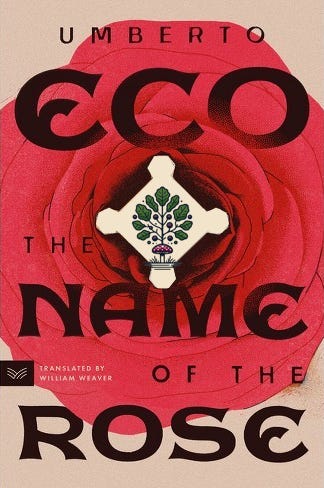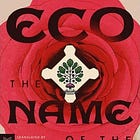The Thinking Man's Guide to The Name of the Rose
A Reader's Guide from the Thinking Man Book Club
John:
How to describe my devotion to all things Eco? Where to begin? Let’s see.
It all started about 3 months ago, when I discovered Italo Calvino and the great Italian writers. I was at Barnes and Noble and was surprised to see a well-stocked section of books from an Italian writer in the general fiction section. Calvino’s book If On a Winter’s Night a Traveler became the top priority on my reading list. After the initial discovery, a search of Calvino taught me a few things: modern Italy produced great literature, not just great food. Calvino was a postmodernist, and his work seems to be quite far from the novel we are set to begin this week, but there’s one thing that ties Calvino and “The Name of the Rose” together: the translator, William Weaver.
In preparation for reading Crime and Punishment, I became obsessed with which translation I was going to commit to. Eventually settling on the Oliver Ready translation, the research sent me into a deep dive. The importance of a translator to the work cannot be overlooked. In theory, anyone could translate a book by using an English/[enter language here] dictionary. But to be an effective translator, one who really projects the meaning and tone of the original onto the new language, you have to immerse yourself in the culture just as much as the language—or so William Weaver said.
So there I was, browsing Italo Calvino’s Wikipedia, spiraling down a rabbit hole. From If on a Winter’s Night I found Weaver and promptly clicked on him. I was fascinated by the results. Born in Virginia and a graduate of Princeton, he was an ambulance driver for the American Field Service in Italy during World War 2 and eventually went to Rome for postgraduate studies in 1949. He stayed there through the 50s and met Italian writers and scholars before eventually coming back to the United States and professoring it up at Bard College (which we had last heard about in our Steely Dan piece a few weeks ago). Weaver died in Rhinebeck, NY in 2013 (if you haven’t been, it’s a beautiful area).
Here’s a quote from Weaver from the Paris Review in 2002, "Some of the hardest things to translate into English from Italian are not great big words, such as you find in Eco, but perfectly simple things, 'buon giorno' for instance. How to translate that? We don't say 'good day,' except in Australia. It has to be translated 'good morning' or 'good evening' or 'good afternoon' or 'hello.' You have to know not only the time of day the scene is taking place, but also in which part of Italy it's taking place, because in some places they start saying 'buona sera' ('good evening') at 1:00 P.M. The minute they get up from the luncheon table it's evening for them. So someone could say 'buona sera,' but you can't translate it as 'good evening' because the scene is taking place at 3:00 P.M. You need to know the language but, even more, the life of the country."
If that isn’t what you want out of your translator, what do you want? RIP Willy; he seemed pretty cool. Anyway. At the top of Weaver’s Wikipedia it mentions he’s best known for translating the works of Umberto Eco, Primo Levi, and Italo Calvino. My first reaction was simply, there’s more?! Who’s this Eco guy? How is the greatest author of all time, Italo Calvino (who I haven’t read a single sentence by), listed last?
I decided to investigate, and clicked on the blue hyperlinked name of Umberto Eco first. The rest is history. Google him. What does it say? Italian medieval historian and philosopher. That sounds cool. He was also a semiotician and his novels include biblical analysis, philosophy, and mystery which we will see a lot of in “The Name of the Rose.” His second novel “Foucault’s Pendulum” deals with similar themes. Look up a description of another one of his novels, “The Prague Cemetery.” It sounds insane.
In short, this guy rules. Born in the Piedmont region of Italy in 1932, Eco was knee deep in the spread of Facism throughout the country until his town was liberated in 1945 and he was exposed to the great American invention of comic books. He then went to the University of Turin, where his philosophy degree was capped off by his thesis on the aesthetics of Thomas Aquinas (who we will read about in the book this week!). Eco was a professor at the University of Bologna from 1971 to his death, and didn’t write his first novel until “The Name of the Rose” in 1980.
Here’s a few fun facts: Eco’s name is a subject of interest. Since his grandfather was an orphan, he was given a last name by the city. Umberto believed Eco was an acronym for ex caelis oblatus which is Latin for “a gift from the heavens”. Will we be agreeing with that statement by the end of this thing? Who knows. Apparently our boy made the first 100 pages extremely hard to get through in order for the worthy to get to the good stuff. Are we worthy? Some of you are; I’m probably not to be honest. Okay, last fun fact, started by a not so fun fact. Eco died in 2016. During his life he divided his time between an apartment in Milan and a vacation home in the region of Marche. Both residences were home to some serious libraries. His Milan apartment had a 30,000-volume collection and his vacation home had a 20,000-volume collection. I wonder how many of those books were duplicates.
Speaking of Turin, I learned over the weekend that that’s where my grandfather served in the Italian army for a little under two years in the 1950s. I always imagined Nonno in the farms of Sicily, yet he got to travel his home country quite a bit during his army days. Speaking of my heritage, my entire life I teased my dad for automatically assuming everything and anything that’s Italian/Sicilian is amazing—which he does. When I first moved out, I would ironically imitate my dad on this to Melissa anytime anything Sicilian/Italian crossed our path. Suddenly, however, I realized the ironic imitations were becoming unironic, and I was suddenly totally in on thinking anything that had a ‘Made in Italy’ stamp (Eco and Calvino books included) must be amazing. You really do turn into your parents, right?
Anyway. So that’s how we got here. I never got a chance to read “If On a Winter’s Night a Traveler,” but I’m sure it’s great and have two copies I prematurely bought waiting to be read on my book shelf. And although I haven’t read a single word ever written by Umberto Eco, I’m almost positive he’s my favorite author of all time. I guess we’ll find out if that holds true in the weeks to come.
Melissa:
Well, John basically said everything there is to say. I’m excited to read this one. Like most books I end up loving, John picked this one out (and, seeing as I picked out Dune, you should take this as a very encouraging sign).
Eco seems awesome, and I have to admit, I’m intrigued by the “the first 100 pages are a test for the worthy” thing.
If this intimidates you, pick up a copy of The Key to the Name of the Rose (or check it out for free from the Internet Archive). It translates all of the non-English passages in the book (which is really helpful, because the thing is apparently riddled with untranslated Latin), and provides a glossary of the numerous historical figures who are referenced in the book.
Apparently, Umberto Eco swore that such a book wasn’t necessary to understand his novel. I don’t know if he expects his readers to know all that stuff or if he thinks context will help us figure it out, but my history is pretty shaky and my knowledge of Latin doubly so, so I’ll be using it.
The Schedule:
In order to avoid dragging this thing along too far, we’ll be powering through the book’s first “day” (approximately the first 100 pages) this week.
The book is broken up into seven “days.” As of now, we’re aiming to get through one a week.
Just starting out? Follow along at your own pace below:
Join the discussion! We’d love it if you followed along and contributed your own knowledge and insights.
Remember, we’re going in blind—did we miss anything important?








Fabulous post, and I look forward to vicariously reading your commentary!
I am looking forward to reading this book. I may have read it when it first came out but I was 18 years old at the time. I do remember this being on the best seller list.